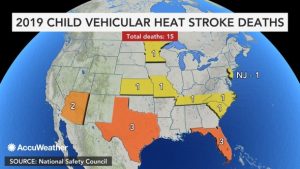Child Hot Car Deaths Lawyer
A staggering number of children die in hot cars. The number of child hot car deaths this year is currently 18 and the summer has just begun in many parts of the U.S. According to the National Safety Council (NSC), 52 children died last year after being trapped inside an overheated vehicle. Research indicates that in more than half of these tragic fatalities, the child was forgotten in the vehicle by a parent or caregiver.
These senseless tragedies could have been prevented. The NSC https://www.nsc.org/ says that, even leaving windows slightly open, a car’s temperature can increase by 20 degrees in 10 minutes and 50 degrees in a half-hour, causing heatstroke, which is a life-threatening medical emergency. Children are much more vulnerable to heatstroke. Their little bodies heat up three to five times faster than an adult’s. In a hot car, their body temperature can quickly rise to 104 degrees Fahrenheit or higher. This overwhelms a child’s normal ability to cool off and poses an immediate risk for brain damage or death, notes the American Academy of Pediatrics.

While most deaths have occurred when a child has been forgotten in the back seat, NSC data shows that 26 percent of deaths were attributed to children having gotten inside a vehicle on their own. Horrifically, almost 20 percent of deaths happened because children had been intentionally left in a vehicle.
Tips to Prevent Child Heatstroke Death in Vehicles
To prevent children from getting into a vehicle by themselves, parents must tell their children that cars are not a play area and all cars parked at their home must be locked at all times, regardless of the weather. Please make it a habit.
Leaving a child alone in a car is illegal in many states. Safety experts advise that you put something you need, such as a purse or employee badge, in the back seat so that you must open the back door (and see that your child is there) before leaving the car.
Sensors and apps are available: they send alerts to a cellphone to warn that your child is still in the vehicle.
The NSC offers a free online course, at https://training.nsc.org/hot-cars/. It includes more preventive tips and provides information on the danger of vehicular heatstroke in children.
Leaving a Child in a Hot Vehicle: Is Death by Hyperthermia a Crime?
Child Hyperthermia Death in vehicles is on the rise. Two decades ago, it rarely happened. In 2009, the Washington Post ran a story titled “Fatal Distriction”, which won the Pulitzer Prize for Gene Weingarten. It describes parents who forgot their children in the backseat of the car. They returned to find their children dead. Weingarten wrote the following:
“In the early 1990s, car-safety experts declared that passenger-side front airbags could kill children, and they recommended that child seats be moved to the back of the car; then, for even more safety for the very young, that the baby seats be pivoted to face the rear. If few foresaw the tragic consequence of the lessened visibility of the child . . . well, who can blame them? What kind of person forgets a baby?”
Vehicles Need Safety Devices and Alerts
Anyone can forget, from a pediatrician to a policeman to a pizza chef. Weingarten interviewed 13 parents for the story; he said that, not only did they come from all walks of life, rich and poor; they were introverted and extroverted, sweet and sullen. More than one parent tried to commit suicide. One mother has been lobbying for a law that requires back-seat sensors in cars that would sound an alarm if a child’s weight remained in the seat after the ignition is turned off. She hasn’t succeeded yet.
The Cameron Gulbransen Kids’ Transportation Safety Act in 2008 never made the final bill either. It required safety improvements in power windows and in rear visibility, and protections against a child accidentally setting a car in motion, and it also had a rear seat-sensor requirement.
A father who left his son to die in a NASA parking lot invented and patented (along with two others) a device with weight sensors and a keychain alarm. Based on aerospace technology, it was easy to use; it was relatively cheap, and it worked. But they couldn’t sell mainly because marketing studies indicated it wouldn’t be a big seller – people think this could never happen to them.
If you would like to learn more about child hot car deaths and how best to safeguard your youngster against these dangers, contact child injury lawyer Jeffrey Killino today at 877-875-2927 to discuss any questions you may have with him.




